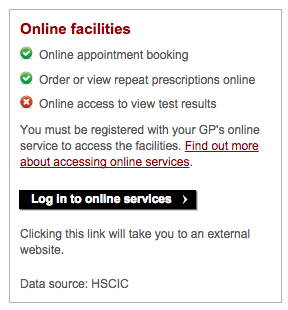GPs deal with a whole range of health problems. They also provide health education, offer advice on smoking and diet, run clinics, give vaccinations and carry out simple surgical operations.
GPs usually work in practices as part of a team that includes nurses, healthcare assistants, practice managers, receptionists and other staff. Practices also work closely with other healthcare professionals, such as health visitors, midwives, mental health services and social care services.
If your GP cannot deal with a problem, then you'll usually be referred to a hospital for tests, treatment, or to see a consultant with specialist knowledge.
 GP practices should make information about their services easily available to their patients. Most practices have a practice leaflet available – please ask for one.
GP practices should make information about their services easily available to their patients. Most practices have a practice leaflet available – please ask for one.
Practices also display information about their services and members of staff on NHS Choices; simply use the "services near you" facility to look up a GP practice. Once you’re on the GP profile, you can also find out what online services are provided by your GP, such as appointment bookings or ordering repeat prescriptions. Each available service is listed under "online facilities" on the "overview" and "facilities" pages of the GP profile (see example image). You can log on to online services directly from NHS Choices. Alternatively, you can check with your GP practice.
Choosing a GP
You have the legal right to choose a GP practice that best suits your needs. Try comparing GP practices according to facilities, services, access and performance before you decide. Ask friends, relatives and others you trust for their thoughts and recommendations.
The GP practice must accept you, unless there are reasonable grounds to refuse you. These must not relate to race, gender, social class, age, religion, sexual orientation, appearance, disability or a medical condition. It must also give you reasons for its decision in writing. A GP practice may refuse to register you because:
- it has no capacity to take on new patients
- it may not be accepting patients that do not live within its practice boundary
- in your particular circumstances, it may not be appropriate for you to register with a practice that is a long way from where you live
Since January 2015 all GP practices in England are free to register new patients who live outside their practice boundary area, but it is for a practice to decide, at the point of registration, whether it is clinically appropriate and practical to register individual patients in that way. For more information, read about patient choice of GP practices.
You can read more about your legal rights to choice in the NHS on the GOV.UK website.
If you have problems registering with a nearby GP practice, contact NHS England’s Customer Contact Centre.
Can I change GP practice?
You have the right to change practices if you wish to. Many people switch practices because they:
Whatever your motives, you can change practices without having to give a reason. However, it is helpful to tell the practice you are leaving. You can then approach another practice and apply to join its list of patients.
Being registered at another local practice is not a reason to be refused registration with another GP.
Registering with a GP
When you have found a practice you like, you'll have to formally register with it as an NHS patient by submitting a registration form to them. The GMS1 form (PDF, 106kb) is available in the practice, or you can download it from this site. Forms may vary slightly and some practices use their own version.
When you have completed and returned the form, NHS England will transfer your medical records to your new practice and write to you to confirm your registration as a patient with that practice.
Parents or guardians can register a baby at a practice by completing and presenting form FP58 (PDF, 34kb), which is issued at the same time as a birth certificate.
Some GP practices may ask for proof of identity when you register, especially when you register children in your care. This may be used to check your details match with the information held on the NHS central patient registry and that your previous medical notes are passed on to the new practice.
 You should not be refused registration or appointments because you don’t have a proof of address or personal identification at hand. It is not considered a reasonable ground to refuse registration. This also applies if you are an asylum seeker, refugee, a homeless patient or an overseas visitor, whether lawfully in the UK or not.
You should not be refused registration or appointments because you don’t have a proof of address or personal identification at hand. It is not considered a reasonable ground to refuse registration. This also applies if you are an asylum seeker, refugee, a homeless patient or an overseas visitor, whether lawfully in the UK or not.
 If you fall under one of the above mentioned patient groups, please download one of the ‘How to register with a GP’ patient leaflets below and bring it with you when you register with a GP practice. If you have problems registering with the practice, there is advice on what do to and where to go for further support.
If you fall under one of the above mentioned patient groups, please download one of the ‘How to register with a GP’ patient leaflets below and bring it with you when you register with a GP practice. If you have problems registering with the practice, there is advice on what do to and where to go for further support.
